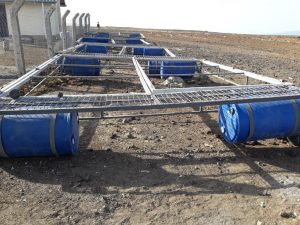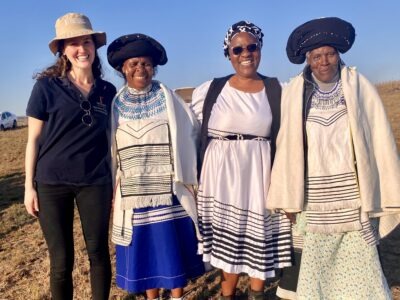
For several years, fishers in Loiyangalani town, located on the shores of Lake Turkana, have been using the casting method to earn a living. This outdated method, over time, has resulted in low yields caused by overfishing and low replenishment rates. The method goes against United Nations standards, which regulate the use of drift nets more than 2.5 kilometers long in the marine environment.
However, a lack of enforcement of these regulations puts more pressure on the lake, causing degradation and limiting catches from the wild fisheries. Many fishers experienced reduced catch sizes and lower incomes as a result. This led to an irregular supply of fish to the market. With fishing as the second biggest economic activity in Loiyangalani, residents needed more sustainable fishing practices to bolster the supply and ensure food and income security.
Feed the Future and Private Sector Partner Introduce Cage Fish Farming

To address these significant constraints in the fish value chain, USAID, through its Expanding and Diversifying Viable Economic Opportunities Activity, identified a lead firm, or “anchor firm,” Songoyo Enterprises, through a competitive process. The firm is a private sector actor with experience in wildlife and natural resources management. Songoyo Enterprises is adopting cage fish farming, a practice that will, among other things, replenish fingerlings, to Lake Turkana. The Activity Award, which is implemented by ACDI/VOCA and its partners Mercy Corps, Smart Regional Consultants, and the BOMA Project under the Feed the Future-funded Livestock Market Systems (LMS) Activity, co-invested $140,000 with the company for an investment ratio of 85 percent and 15 percent, respectively.
Cage fish farming involves raising fish in an enclosure within a water body confined on all sides by mesh material. The mesh secures the fish inside while allowing strong currents to circulate throughout the cages, thus ensuring favorable conditions for fish growth. With cage farming, there is enough year-round supply of fish not only to restock the lake but also to sell and consume in the region and further afield in Kisumu and Nairobi.
Community and County Government Lend Support
Both the community and local government have supported this investment. The community granted Songoyo Enterprises land to rear fingerlings, and the county government authorized the investor to use the lake to set up cages for mature fish. In partnership with the Kenya Marine and Fisheries Research Institute, t county government, Lake Turkana Beach Management Unit, Songoyo Enterprises will address overfishing practices by local fishers. Together, they will also help connect women, youth, smallholder fishers, entrepreneurs, distributors, depots, and consumers to fresh, high-quality fish.
With the support of USAID, Songoyo Enterprises will rear 5,000 fingerlings of local tilapia in three hatchery cages on five-acres. After two months, the fish will be transferred to 12 cages located on Lake Turkana, where they will be fed and managed until they reach the right size and weight for harvesting.
Marsabit County, through its Department of Fisheries, has shown great interest in the investment’s success. In September 2020, a team from the department met with Songoyo Enterprises representatives to discuss how the farm could act as a learning site for training others in modern fish farming techniques. The Department of Fisheries also indicated that the farm could be contracted to produce fingerlings to replenish the lake’s fish population. Meanwhile, Marsabit County is constructing an ultra-modern fish factory in Loiyangalani, and Songoyo Enterprises is set to be one of its main suppliers.
New Methods Revitalize Fishing Economy
The fish farm is estimated to produce 13.5 tons of fresh tilapia monthly, surpassing the two tons needed by Marsabit County and producing enough to restock the lake. Songoyo Enterprises’ efforts will directly benefit 200 people, including fish producers, suppliers, and distributors who will receive supply contracts, access to end markets, and new skills and knowledge in sustainable fishing. Four hundred members of the Loiyangalani, Yomo, and Elmolo Beach Management Units (BMU) as well as the Loiyangalani Fishermen Cooperative will benefit from the lake’s fish population being replenished. Improved technologies will not only increase productivity but also reduce post-harvest losses through the use of solar-powered chest freezers for storing fish before transporting them to end markets.
“This investment will transform not only Loiyangalani but Marsabit County. It will provide jobs, thereby increasing livelihood incomes for both direct and indirect individuals working in the supply and value chain, as well as offer alternative nutrition for the community and county. Upon completion of the ultra-modern fish processing factory, we will depend on the regular supply of Songoyo Enterprises to enable the factory to operate all year round.”
— Jarred Bogita, Marsabit County Director of Fisheries
USAID’s investment shows how adopting sustainable methods of fishing can increase both yields and household incomes. The private sector will also play a critical role in introducing improved fishing technology to local producers, who now stand poised to crowd into the sector using sustainable practices.
Learn more about the Feed the Future Kenya Livestock Market Systems Activity.
Learn more about our work in Kenya.





